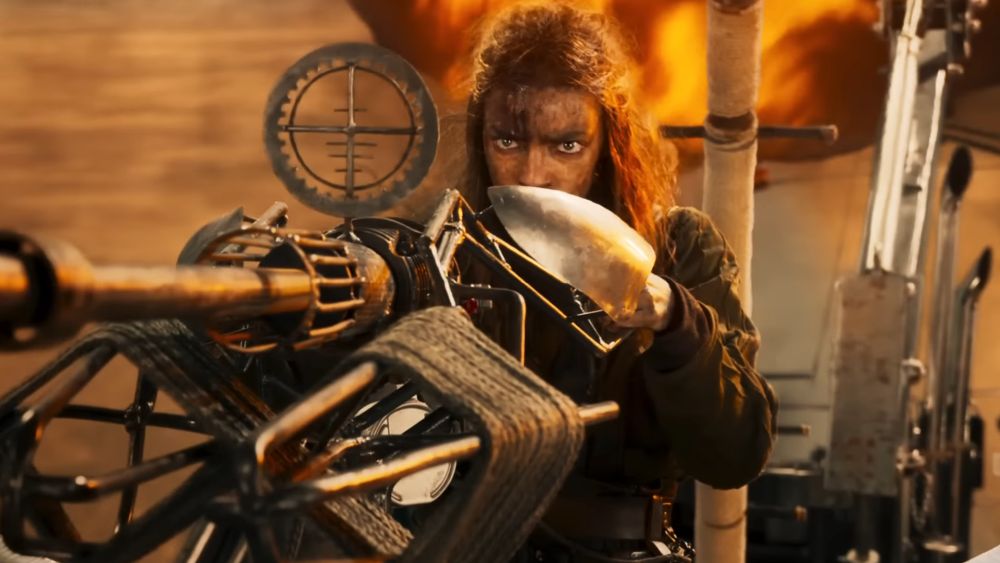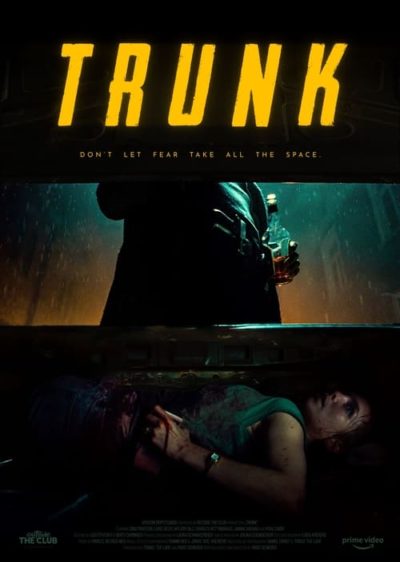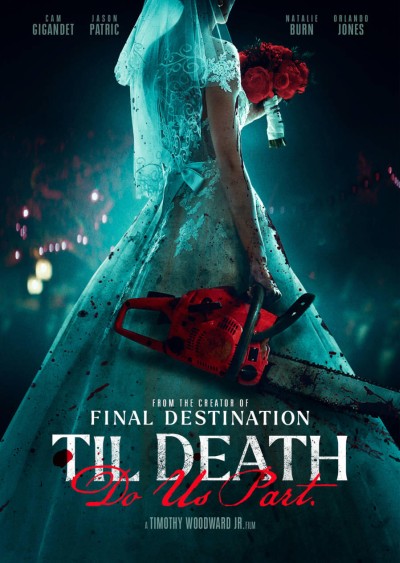 ★★★★½
★★★★½
“The Fast and the Furiosa”
 It was a good run. There was a point, not long ago, when action heroines could do no wrong. In hindsight, the golden era may have started in 2012 when the Hunger Games franchise began, along with Brave. Summers which followed brought us blockbusters such as Gravity, Maleficent and Lucy. Subsequent years covered the entire run of the Hunger Games and the end of the Resident Evil franchises (or, at least, phase 1 for them), and things probably peaked with Wonder Woman in 2017. Thereafter things began to decline, though I’d say returns remained strong through much of 2019. That’s when Maleficent: Mistress of Evil and Alita: Battle Angel each made over $400 million worldwide, finishing in the top 25 movies of the year.
It was a good run. There was a point, not long ago, when action heroines could do no wrong. In hindsight, the golden era may have started in 2012 when the Hunger Games franchise began, along with Brave. Summers which followed brought us blockbusters such as Gravity, Maleficent and Lucy. Subsequent years covered the entire run of the Hunger Games and the end of the Resident Evil franchises (or, at least, phase 1 for them), and things probably peaked with Wonder Woman in 2017. Thereafter things began to decline, though I’d say returns remained strong through much of 2019. That’s when Maleficent: Mistress of Evil and Alita: Battle Angel each made over $400 million worldwide, finishing in the top 25 movies of the year.
The cracks began to show with Captain Marvel, odd though it is to say, given it made over a billion. But to a large extent I suspect it mostly surfed on the success of Avengers: Endgame. Thereafter, Wonder Woman: 1984 flopped just before the pandemic hit, Black Widow underperformed, and since then it’s been almost entirely a series of failures, with only the arguable Hunger Games reboot reaching even $250 million worldwide over almost three years since. Instead, we had one of the biggest bombs of all time in the The Marvels, followed up by the disastrous box-office of Madame Web. And now the prequel to Mad Max: Fury Road, managed an opening weekend in North America of only $26.3 million. That’s forty-two percent below its predecessor’s opening, excluding nine years of inflation.
It’s not all action heroines’ fault (though some on social media are claiming so). This year has been dismal in general. With three midweek days left on the month at time of writing, box-office for May is down 36% on May 2023 – and even that was the lowest non-pandemic May since 2001, again without adjusting for inflation. People just aren’t going to the movies in anything like the same numbers. I can’t say I blame them, when films appear on streaming services as little as three weeks after their theatrical release. Going to the pictures is expensive, and especially with the improvements in home theatre, the overall experience can end up being worse than staying at home, between travel, over-priced concessions, idiots talking on their phones, etc. Why not wait?
 The counterpoint is experiences like this, a full-on, bombastic, in your face event that made full use of everything IMAX has in its locker, and surpassed anything I could get at home. Now, your mileage may vary. Poor Chris, in particular, found it too overwhelming, triggering motion sickness which forced her to close her eyes any time things got too kinetic – which was a lot of the time. We probably will not be IMAXing again in future. But the only recent comparable experience for me was Godzilla: Minus One. Re-reading my review of Fury Road, I’m a bit surprised I only gave it four stars. I’ve seen it again since, and I’ve just upgraded it an extra half-star. Put another way, Furiosa is every bit its equal. Different, but equal.
The counterpoint is experiences like this, a full-on, bombastic, in your face event that made full use of everything IMAX has in its locker, and surpassed anything I could get at home. Now, your mileage may vary. Poor Chris, in particular, found it too overwhelming, triggering motion sickness which forced her to close her eyes any time things got too kinetic – which was a lot of the time. We probably will not be IMAXing again in future. But the only recent comparable experience for me was Godzilla: Minus One. Re-reading my review of Fury Road, I’m a bit surprised I only gave it four stars. I’ve seen it again since, and I’ve just upgraded it an extra half-star. Put another way, Furiosa is every bit its equal. Different, but equal.
It’s a direct prequel, ending at the point when Furiosa (Taylor-Joy) leads the wives to escape from The Citadel. It begins with a much younger Furiosa (Browne) living in the Green Place, a rare place of plenty in the post-apocalyptic hell which Australia has become, along with the rest of the world. She’s kidnapped from there by minions of Dr. Dementus (Hemsworth), leader of the Biker Horde. Her mother is killed trying to rescue her, and Furiosa becomes the little, mute pet of Dementus, until he trades her to Immortan Joe, who runs the Citadel. Over the subsequent years, she becomes a key part of operations, becoming the partner of Praetorian Jack (Burke), who trains Furiosa and falls in love with her.
Dementus, meanwhile, is working to become the wasteland’s supreme ruler by taking over the Citadel, Gastown and the Bullet Farm. In an ambush at the last-named, Jack is captured and tortured to death, while Furiosa escapes only by tearing off her own arm. She returns to the Citadel, providing key advice to Joe in the ensuing war. But she never loses sight of her final goal: to make Dementus pay for what he did to her and her mother. Given she appears in Fury Road and Dementus does not… Well, you can probably figure out how this is going to end. Though the reported final nature of her revenge is not what you might expect, and has a certain poetic resonance, given what happened previously.
It isn’t quite the same relentless stream of action as Fury Road, and at almost half an hour longer, that’s no bad thing. There’s no shortage of action, but it tends to align with the way the story is broken into chapters. So you get a series of Drama-Action-pause segments – or occasionally for variety, Action-Drama-pause. There were concerns regarding the amount of CGI in the trailer, and I will say, it’s not as almost entirely physical as Fury Road either. However, what’s used is integrated very well, with only a couple of moment wheres the action momentarily seems obviously adjusted digitally. I suspect some of the landscapes were also enhanced: they and cinematographer John Seale’s work is so stunning, I don’t care there.
My other concern was having Taylor-Joy replace Charlize Theron, who simply has more presence. That does remain an issue, though to the new actress’s credit, to a lesser degree than I feared. It’s also countered by having much more of a real antagonist here in Dementus. The first film was mostly an extended chase sequence: Furiosa was running from Immortan Joe, after helping his wives escape, and they shared very few scenes together. Here, Dementus gives us a stronger “villain,” and the film as a whole is better for it. Hemsworth brings a charismatic power to his character, to the point where you can see why his henchmen follow him, unto death. Furiosa, in contrast, is really not much of a people person.
It’s difficult to pick out any one action highlight, because they are all very, very good. I think the ambush at the Bullet Farm might me the one which sticks most in my mind for now, though this may change on (the almost certain) re-viewing at home. It’s one which offers the most interesting environment, including buildings and smoke stacks, while the others are somewhat limited by operating in a desert. I mean, it is called “the Wasteland” for a reason. However, when Miller puts Jack and Furiosa in their rig, which is being stormed by almost endless waves of raiders, you really do not need a backdrop. Indeed, you could argue that any such would be at best irrelevant, and at worst a distraction.
 You would be hard-pushed to argue that the $168 million budget is not up on screen. I lost count of the times when I wondered whether what I was looking at really existed in the physical world, or was matte paintings and CGI. Part of me wants to peer behind the curtain and watch the behind the scenes videos. However, part of me would prefer to sustain the illusion, which was a factor in the sense of wonder that often washed over me during the screening. It’s the quest for that sense of awe which keeps me going to cinemas, even if most of the time, I end up leaving disappointed [I’m looking at you, Godzilla X Kong…]
You would be hard-pushed to argue that the $168 million budget is not up on screen. I lost count of the times when I wondered whether what I was looking at really existed in the physical world, or was matte paintings and CGI. Part of me wants to peer behind the curtain and watch the behind the scenes videos. However, part of me would prefer to sustain the illusion, which was a factor in the sense of wonder that often washed over me during the screening. It’s the quest for that sense of awe which keeps me going to cinemas, even if most of the time, I end up leaving disappointed [I’m looking at you, Godzilla X Kong…]
I also want to praise one other aspect, which may not transfer as well to my home environment (and I admit it is limited in this area): the audio. There are not many times when I can specifically point to this in particular as significantly enhancing the experience. I’m not an audiophile, and generally put what I see considerably ahead of what I hear. But in this case, Tom Holkenborg’s score and the rest of the sound elements were a notable and impressive component. From the rumblings of the engines through to the wind whipping across the Wasteland, the sonic design really worked, and allowed me to feel like I was being brought into the world of Furiosa. Well played
The problem from a business perspective is, it seems all but certain the makers are not going to recoup their investment, making it less likely you will see investments like this going forward. Fury Road probably just about broke even, so this was always going to be a gamble, especially without your leads. And, indeed, outside of the title, entirely without the character who has powered the franchise since its first installment, all the way back to forty-five years ago. In hindsight, a reaction of “What the hell were they thinking?” is probably understandable. But I am glad less-wise heads prevailed. If this is to be the end of the Mad Max universe, it goes out on another spectacular high, and not many franchises are able to say that.
Dir: George Miller
Star: Anya Taylor-Joy, Chris Hemsworth, Tom Burke, Alyla Browne





 This was watched, effectively as the B-feature before Furiosa, with expectations along appropriate lines, given that basis. And as such, this is fine. It’s glossy, shiny and well-crafted technically, albeit making little or no emotional impact. This is partly because, in the early going, it feels suspiciously like someone said, “Hey Siri! Rewrite the script for
This was watched, effectively as the B-feature before Furiosa, with expectations along appropriate lines, given that basis. And as such, this is fine. It’s glossy, shiny and well-crafted technically, albeit making little or no emotional impact. This is partly because, in the early going, it feels suspiciously like someone said, “Hey Siri! Rewrite the script for  This shouldn’t be confused with the BBC
This shouldn’t be confused with the BBC  This begins with the young Helena, living deep in the woods with her mother and father, Jacob (Mendelsohn). He’s teaching her the ways of the forest, including hunting and the need to be ruthless, with the top priority expressed in the tagline above. However, things aren’t quite what they seem: it feels like it could be a century ago, yet the tranquil illusion is shattered when a lost stranger on an ATV rides up. Mom makes a break for freedom with Helena, for it seems this is actually a kidnapping which has gone on for a long time. Fast forward twenty years: Jacob is in prison, mom killed herself and Helena (Ridley) is working a dead-end job, but married to Stephen (Hedlund), and with a daughter, Marigold.
This begins with the young Helena, living deep in the woods with her mother and father, Jacob (Mendelsohn). He’s teaching her the ways of the forest, including hunting and the need to be ruthless, with the top priority expressed in the tagline above. However, things aren’t quite what they seem: it feels like it could be a century ago, yet the tranquil illusion is shattered when a lost stranger on an ATV rides up. Mom makes a break for freedom with Helena, for it seems this is actually a kidnapping which has gone on for a long time. Fast forward twenty years: Jacob is in prison, mom killed herself and Helena (Ridley) is working a dead-end job, but married to Stephen (Hedlund), and with a daughter, Marigold. This certainly wastes no time. Malina (Martens) regains consciousness to find herself in the trunk of a car stopped at a petrol station. Things get worse, as she discovers her legs are paralyzed, and she has a nasty wound in her lower abdomen. How did she get there? And more importantly, what can she do to escape her predicament? It’s certainly one hell of a hook, and in the way it hits the ground running – as well as its Germanic origins, almost real-time approach and the plucky heroine with a sketchy boyfriend, forced to survive on her own – reminded me of
This certainly wastes no time. Malina (Martens) regains consciousness to find herself in the trunk of a car stopped at a petrol station. Things get worse, as she discovers her legs are paralyzed, and she has a nasty wound in her lower abdomen. How did she get there? And more importantly, what can she do to escape her predicament? It’s certainly one hell of a hook, and in the way it hits the ground running – as well as its Germanic origins, almost real-time approach and the plucky heroine with a sketchy boyfriend, forced to survive on her own – reminded me of  I was intrigued by this, mostly due to the presence of Penn, an Australian champion in karate who appeared (albeit, in minor roles) in a number of Hong Kong action movies of the nineties. Her blonde hair made her stand out, as one of the few gwailo women to be seen in the genre. This TV movie, intended as a pilot for a series appears to have been her swing at stardom in the West. After it fell agonizingly short, she seems to have given up on acting entirely. She now appears to be the CEO of Signal 8 Security, a private security company back in Hong Kong – the celebrity clients listed on the company’s website appear to include Jackie Chan, ironically enough.
I was intrigued by this, mostly due to the presence of Penn, an Australian champion in karate who appeared (albeit, in minor roles) in a number of Hong Kong action movies of the nineties. Her blonde hair made her stand out, as one of the few gwailo women to be seen in the genre. This TV movie, intended as a pilot for a series appears to have been her swing at stardom in the West. After it fell agonizingly short, she seems to have given up on acting entirely. She now appears to be the CEO of Signal 8 Security, a private security company back in Hong Kong – the celebrity clients listed on the company’s website appear to include Jackie Chan, ironically enough. It’s often forgotten that America didn’t join World War II until almost three years after it started. In the early days, there was a strong isolationist movement, which saw the conflict as other countries’ problems, from people like aviator Charles Lindbergh and broad groups like the America First Committee. Indeed, there was a surprising amount of support for the Nazi regime: in February 1939, a rally at Madison Square Gardens drew twenty thousand people, and even after the war started in Europe, there was significant activity attempting to keep America out. It’s in this period, between the start of the war and the bombing of Pearl Harbor, that the story told here takes place.
It’s often forgotten that America didn’t join World War II until almost three years after it started. In the early days, there was a strong isolationist movement, which saw the conflict as other countries’ problems, from people like aviator Charles Lindbergh and broad groups like the America First Committee. Indeed, there was a surprising amount of support for the Nazi regime: in February 1939, a rally at Madison Square Gardens drew twenty thousand people, and even after the war started in Europe, there was significant activity attempting to keep America out. It’s in this period, between the start of the war and the bombing of Pearl Harbor, that the story told here takes place. Incompetent on every level, this proves there’s a section of cult fandom which would praise a dog turd to the heavens, if told it had a “feminist” message. The title is probably – scratch that, certainly – the best thing about this, suggesting a throwback to the JD films of the fifties, filtered through the lens of Russ Meyer. “Suggesting” is the keyword here, since the reality is more like the finger-paintings of a developmentally challenged three-year-old. I guess the title is actually inspired by Blood Orgy of the She Devils, a film made in 1973 by Ted V. Mikels, one of the most inept directors ever to pick up a camera. This movie is poor enough Mikels would likely require his film’s name be taken off it.
Incompetent on every level, this proves there’s a section of cult fandom which would praise a dog turd to the heavens, if told it had a “feminist” message. The title is probably – scratch that, certainly – the best thing about this, suggesting a throwback to the JD films of the fifties, filtered through the lens of Russ Meyer. “Suggesting” is the keyword here, since the reality is more like the finger-paintings of a developmentally challenged three-year-old. I guess the title is actually inspired by Blood Orgy of the She Devils, a film made in 1973 by Ted V. Mikels, one of the most inept directors ever to pick up a camera. This movie is poor enough Mikels would likely require his film’s name be taken off it. It feels as if South Korea is going through all the Olympic sports, making films based on each of them. Indeed, this film’s alternate title makes it a sequel to Take Off, about ski-jumping. I’ve seen two of the previous entries, covering archery (
It feels as if South Korea is going through all the Olympic sports, making films based on each of them. Indeed, this film’s alternate title makes it a sequel to Take Off, about ski-jumping. I’ve seen two of the previous entries, covering archery ( Great poster. Solid trailer. In the light of those, unfortunately, the film can only be described as a significant disappointment. While it’s good, and occasionally
Great poster. Solid trailer. In the light of those, unfortunately, the film can only be described as a significant disappointment. While it’s good, and occasionally